Letters from Türkiye: Summer 2025 edition
Letters from ...Türkiye relies on high-tech innovation for long-term growth
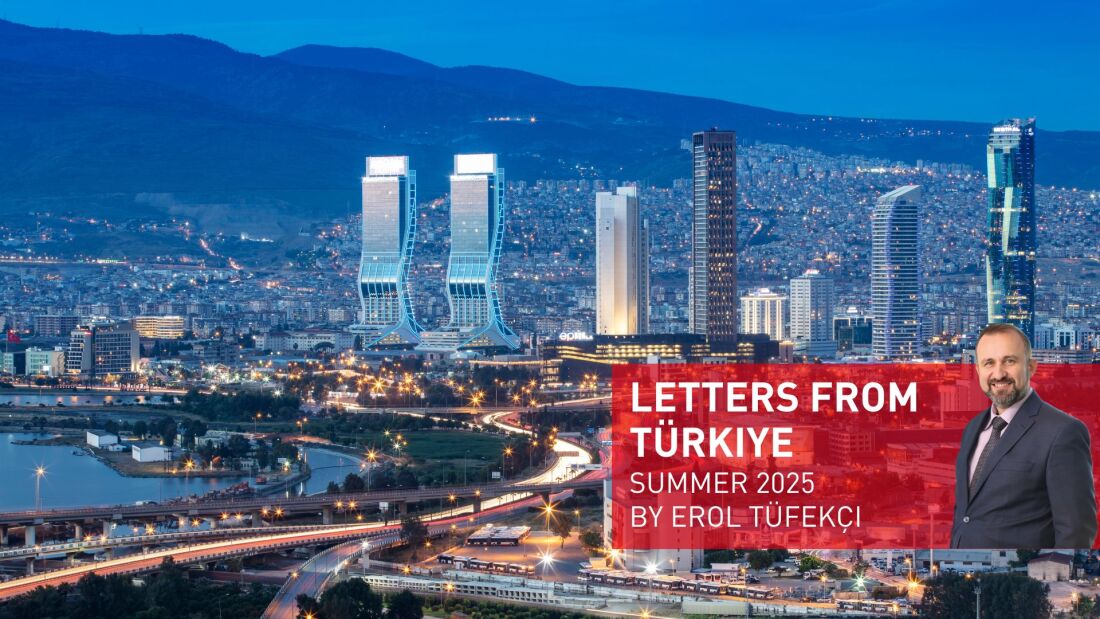
Türkiye is focusing on high-tech innovation in order to achieve long-term growth. Will it succeed? Our Türkiye expert Erol Tüfekҫi explains in our country report.
Erol Tüfekҫi, Director of the Bremeninvest offices of Wirtschaftsförderung Bremen, reports directly from the port city of Izmir, providing us with an overview of the trends, opportunities and new developments in Türkiye.
Türkiye aims to increase foreign investment by 50 Percent
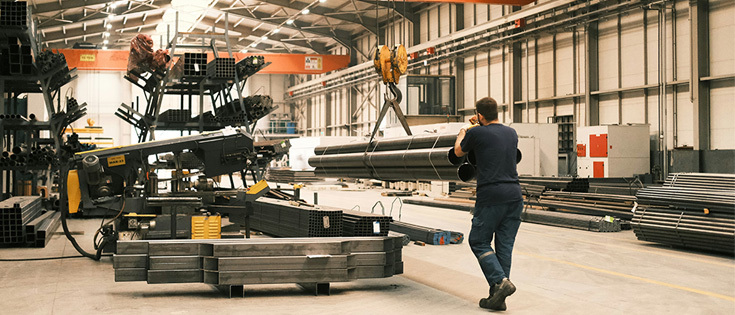
With solid economic growth of around 3% – just below the global average of 3.2% for 2025, but well above the level of the EU countries – Türkiye remains on course for economic expansion. Against this backdrop, the Turkish Ministry of Trade has formulated an ambitious target: to increase Türkiye's share of global foreign direct investment from the current 1% to 1.5% by 2028.
However, in order for Türkiye to become more attractive as an investment location and attract more capital, it must introduce reforms in the short and long term. While the country has made good progress in the fight against inflation and the strict financial policy can report successes, in its latest report the OECD still sees a need to catch up in many areas. These include restrictions on foreign investment in individual sectors, low labour mobility, insufficient participation of women in the workforce, a backlog in climate adaptation and deficits in the area of innovative strength.
High-tech location on the rise
On this last point the OECD sees a discrepancy, which could also be an opportunity for foreign investors. There is a large number of well-educated specialists streaming out of universities, but relatively few suitable jobs for them. According to the OECD, the Turkish economy is still not sufficiently focused on research and development.
The government has also recognised this challenge. It aims to strengthen strategic industries of the future in a targeted manner – such as the production of electric vehicles and batteries, renewable energies, biotechnology, robotics and semiconductor technologies. For international investors, this opens up the opportunity to help shape the necessary innovation dynamics locally.
The European Bank for Reconstruction and Development (EBRD), for example, shows that Türkiye offers many opportunities: it sees Türkiye as one of its most important investment locations. It is particularly active in the green transformation and promoting the female labour force participation rate – two areas that are also named as key development goals by the OECD.
The private sector is also showing a willingness to invest, particularly in production and logistics capacities. Last year, companies such as the automotive company BYD, the wind turbine manufacturer Nordex, the gearbox manufacturer W.E.G. and the compressor manufacturer Kaishan Group announced new plants in Türkiye.
Space industry: ambitious departure into space
The Turkish space industry is also currently developing into a high-tech sector with a future. 2024 marked a milestone with the launch of Türksat 6A, the first communications satellite developed entirely in Türkiye. In the same year, Alper Gezeravcı became the first Turkish astronaut to fly to the International Space Station (ISS). At the same time, the Turkish government negotiated with Somalia on the construction of its own launch platform near the equator – a locational advantage for rocket launches.
The national space programme has set itself ambitious goals. In addition to the development of rocket production, there are also plans for lunar missions and the expansion of the industrial infrastructure. The first international cooperations are already developing, such as with the US company Axiom Space. Cooperations such as these are an important prerequisite for the development of the sector, according to experts. For investors, the space sector offers long-term potential, but requires a pioneering spirit. The sector is still small, the barriers to market entry are high and financing is strongly characterised by state funding. Nevertheless, early involvement can help investors to position themselves strategically.
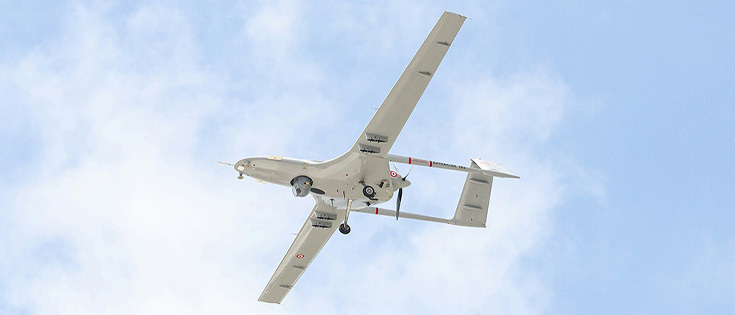
Defence industry: between self-sufficiency and international cooperation
The Turkish defence industry – a sector that has been massively expanded since the US sanctions in 2020 and enjoys high political priority – has developed significantly further. Around 2000 companies now employ around 100 000 skilled workers. Turkish defence equipment is currently exported to more than 170 countries. The country is particularly well known for its powerful drone technology.
A current example of Türkiye's increasing international relevance is the memorandum of understanding signed with Indonesia in April 2024 for the delivery of 48 KAAN fighter jets, a modern multi-role combat aircraft that is still under development. Türkiye is also working on its own aircraft carriers and submarines, which emphasises its ambitions for maritime armament.
This opens up a wide range of cooperation and investment opportunities for European companies. Airbus has been active in the country since 2013 and is planning to expand its involvement. In April 2024, the Italian company Leonardo and the Turkish drone manufacturer Baykar agreed a strategic partnership. The Turkish government supports investments in this sector with extensive incentives, including tax exemptions, customs concessions, accelerated depreciation regulations and assistance in recruiting skilled labour and acquiring space.
Despite its economic potential, the sector is not free from criticism: arms deliveries to politically sensitive regions, the previous use of armaments domestically against Kurdish groups and delays in major projects due to industrial and planning bottlenecks raise ethical and organisational questions. The industry is therefore caught between security policy interests, economic dynamism and social responsibility.
Increasing importance of the energy sector
The energy sector is one of the fastest-growing sectors in Türkiye – in a dual sense. On the one hand, the green energy market continues to grow dynamically, while on the other hand the fossil fuel sector remains a relevant investment focus. We have already reported on the decarbonisation of the sector and the associated opportunities for investors in previous issues. Since then, the expansion of sustainable energies has continued to progress.
In 2024 alone, the World Bank supported green projects in Türkiye with USD 1.9 billion. The European Bank for Reconstruction and Development is also one of the active funding institutions. The Turkish government itself plans to invest around USD 80 billion in the green energy sector over the next eleven years – a clear commitment to the transformation of the national energy supply.
But the expansion does not only concern renewable sources. Substantial funds also continue to flow into the fossil fuel sector. At the beginning of 2024, the Azerbaijani state-owned company SOCAR, the largest foreign investor in Türkiye, announced investments totalling USD 7 billion. Türkiye has also signed a strategic agreement with Somalia to develop Somali oil reserves.
Despite ambitious climate targets – Türkiye is aiming for climate neutrality by 2053 – international organisations such as the OECD currently assume that the country will not reach the peak of its national carbon emissions until 2038. This opens up a broad spectrum of entry opportunities for foreign investors, both in the fast-growing green energy market and in traditional fossil energy projects.
Bremen promotes wind energy cooperation in Türkiye
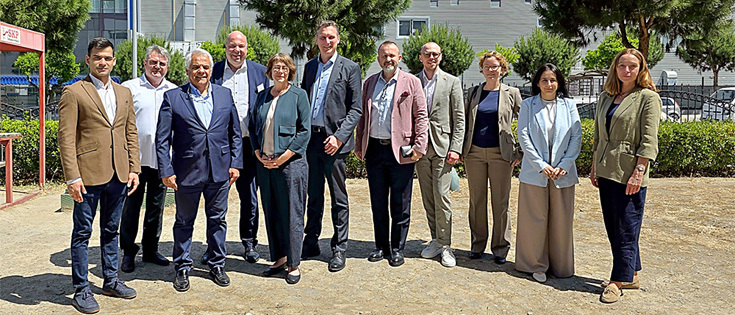
The Turkish renewable energy sector, especially wind power, is growing dynamically and is showing great interest in international partnerships and market expansion. As a pioneering region in the field of wind energy, Bremen enjoys an excellent reputation worldwide and is therefore an ideal location for Turkish companies wishing to venture into Europe.
In May 2025, a delegation from Bremen therefore travelled to Türkiye to explore opportunities for cooperation and present Bremen as a business location. The trip included two central programme items: a full-day investor event in Izmir, followed by company visits and a visit to the Wenergy Expo 2025 trade fair.
The delegation included representatives of the Senator for Economic Affairs, Ports and Transformation, the Bremen Chamber of Commerce - IHK for Bremen and Bremerhaven and the industry network WAB e. V. from Bremerhaven. Together with Bremeninvest, they presented the strengths of Bremen as a business location – with a particular focus on relocation services, funding opportunities and support services for start-ups.
"With around 80 companies, several research institutions and up to 3000 employees in the renewable energy sector, Bremen offers a highly competent, strongly networked cluster. In addition, there are tried-and-tested offshore ports and excellent hinterland connections – ideal conditions for export-oriented Turkish companies," says Andreas Heyer, Chair of the Management Board at Bremeninvest.
Location marketing is having an effect: information days in Izmir and the surrounding area
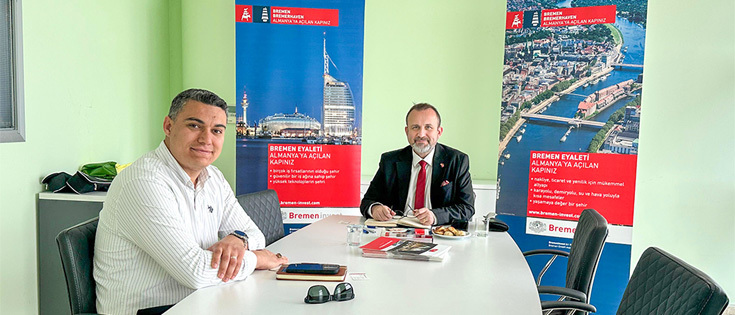
Bremeninvest's Izmir office organised three information days in the first half of 2025. In addition to events in Izmir itself, Bremeninvest office director Erol Tüfekҫi travelled to the neighbouring economic centres of Manisa and Torbalı to present Bremen to potential investors.
Torbalı, located around 20 kilometres south-east of the city centre of Izmir, has around 215 000 inhabitants. In addition to the traditionally strong agricultural sector, the industrial sector here is growing continuously. Many international companies are already active in the area. Germany is the second most important export market. Bremen is therefore an obvious partner for future expansion projects.
The heavily industrialised city of Manisa, in direct proximity to the port of Izmir, also offers a modern infrastructure and skilled workforce. International companies such as Bosch, Viessmann, Ferrero and BYD have already invested there – a clear signal of the region's potential.
The discussions during the delegation's trip showed great interest in Bremen as a European partner and business location. Further cooperations and company relocations are already in preparation.
Success Stories
10 Wind Energy Companies in Bremen – this is where the Wind comes from
Bremen is a pioneer in wind energy. Around 80 companies have set up operations here, covering the entire value chain – from planning and financing to manufacturing and services. We showcase ten businesses that illustrate just how strong the wind energy sector is in Bremen.
Learn moreLetters from Vietnam: Winter 2025 edition
What effects will the sweeping changes in the White House have on Vietnam's economy? Could the current administrative reforms have negative implications for foreign investors? These topics and more will be discussed in the latest Letter from Vietnam.
Learn moreLetters from Vietnam: Summer 2024 – Are German companies underestimating Vietnam?
Are German companies underestimating investment opportunities in Vietnam? And is Cambodia stealing the limelight from Vietnam? You'll find details about all this and more in our summer 2024 Vietnam newsletter.
Learn more
